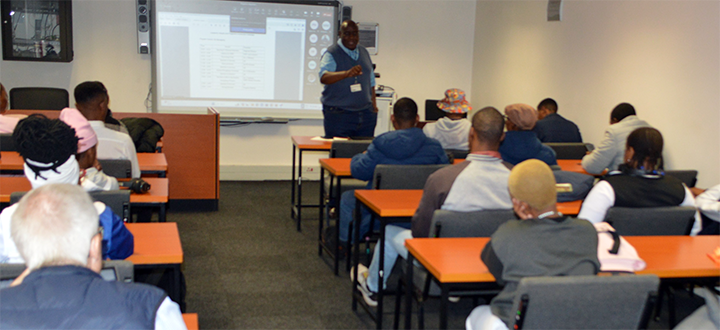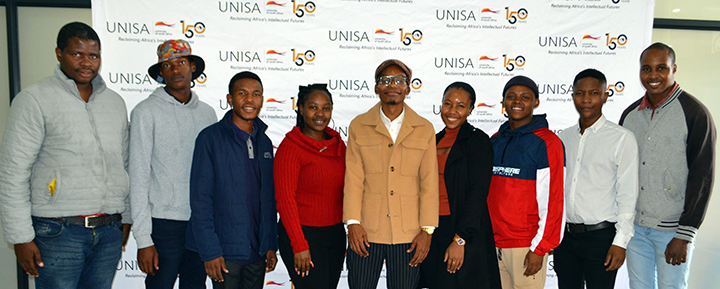News & Events
Unisa Midlands hosts plagiarism awareness workshop
Unisa's Midlands Region, in partnership with the Regional Student Representative Council (RSRC), presented a plagiarism awareness workshop on 8 April 2024 at the Rustenburg Hub. The aim was to create awareness of plagiarism with a focus on proctoring tools, examination processes, and student disciplinary processes.
In his welcoming remarks, Midlands Regional Director, Mathews Kokong, emphasised that plagiarism is legally a crime and a serious transgression in the academic environment. It is an offense that leads to punishment and may result in delays in the student's progress. Therefore, in order not to ruin their future, students should avoid plagiarism. They should be able to generate knowledge, rather than use other authors' information without acknowledging the source.

Mathews Kokong ( Midlands Regional Director) welcomes students to the workshop
Kokong moreover advised students to use Unisa's benefits and resources ethically, responsibly, and with accountability, to avoid being trapped in trouble. He urged students to exercise ethical behaviour and do the right thing, even though no one may be watching. “Avoid plagiarising at all costs, to prevent the consequences of being suspended from studying”, he said.
Moleme Levi, an Online Assessment Advisor, explained that proctoring tools are used to avoid plagiarism and go beyond invigilation. He encouraged students to get to know the proctoring tools and how they operate. He elaborated on the functionality and the processes of navigating and using the invigilator app, IRIS, and module proctoring tools. He explained the dos and don’ts during assessments, and how to prepare for Moodle proctoring by taking part in the mock exams.
During his presentation on examination processes, Frik Prinsloo, Manager of Student Assessment Administration, advised students to prepare for the examinations. He warned them that Unisa has zero tolerance for any form of dishonesty or cheating during examinations and assessments, and that there are consequences for misconduct. He outlined Unisa's values that define individual conduct, which include respect, integrity, honesty, discipline, commitment and humanity. Furthermore, he said, any student who is found to have participated in fraudulent or dishonest conduct related to examinations or assessments will be referred to the disciplinary unit for investigation and disciplinary action.

Unisa Midlands RSRC, from right: Mandla Mbotho ( Education and Training Officer), Clarence Mabutla (National SRC: Deputy President), Morati Lesejane (Treasurer), Kgaswane Kgalalelo (Deputy Secretary), Gomolemeo Sekhute (Chairperson), Saviour Sibaya ( Deputy Chairperson), Aobakwe Mamapula (Secretary), Othepeng Rakobane ( Postgraduate Studies Officer), and Nhlanhla Mabasso (Undergraduate Studies Officer)
Ndhuma Shivambu, Manager in the Student Disciplinary Office, gave an overview of the student disciplinary processes by explaining the rules and principles of the disciplinary code that apply when students commit plagiarism. He also pointed out the negative impacts experienced by students who contravene the disciplinary code. To prevent plagiarism, Shivambu indicated, amongst other things, the need to develop partnerships with student bodies, create awareness, and educate students about the dangers and consequences of plagiarism.
* By Thotogelo Masenya, Communication and Marketing Officer, Unisa Midlands Region
Publish date: 2024-04-17 00:00:00.0

